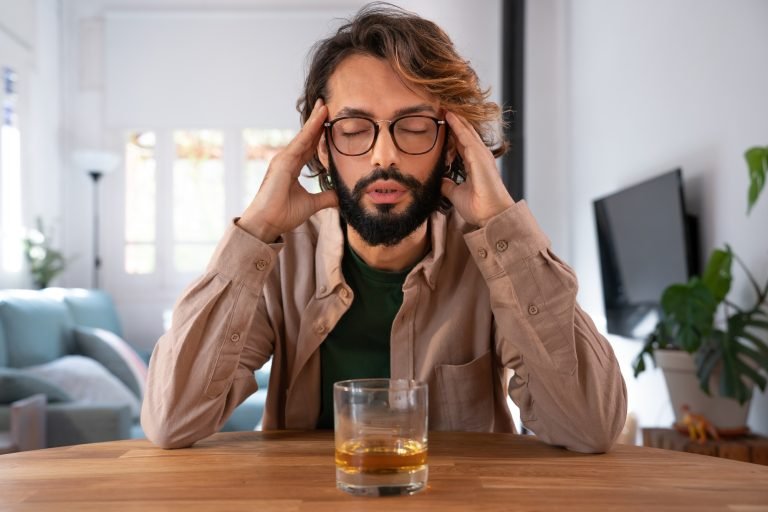Alcohol addiction doesn’t discriminate—it can affect anyone, including creative professionals like writers, artists, musicians, and designers. The pressures of deadlines, the pursuit of inspiration, and the highs and lows of creative work can make alcohol use seem like a coping mechanism. But when does casual drinking cross the line into alcohol abuse?
If you’re a creative professional (or know one), recognizing the signs of alcohol abuse (including withdrawal symptoms and so on) early can make all the difference. Here’s how to spot the physical and psychological symptoms of alcohol addiction before it takes control.
You are Drinking More Than You Intend To
You tell yourself, ‘Just one drink to unwind,’ but one turns into three, then five. Creative professionals often indulge in alcohol use to ‘loosen up’ before a project or to celebrate finishing one. But if you consistently engage in binge drinking more than you planned, it’s a red flag.
The following are signs of too much alcohol dependence:
- You set limits on alcohol use but rarely stick to them;
- You justify drinking as part of your ‘creative process;’ and
- Friends or colleagues comment on how much your alcohol use habits.
If this sounds familiar, your relationship with alcohol might be slipping into dependency.
Your Mood Swings are More Extreme
Alcohol use disorder is believed to disrupt the human brain chemistry. This leads to emotional and mental health instability.
If you’re suffering from alcohol use disorder, you might notice any of the following: irritability when you can’t drink, extreme emotional highs (when binge drinking) and lows (when sober), increased anxiety or depression, and many more.
Creatives are often sensitive by nature—alcohol dependence amplifies those emotions in dangerous ways.
Worry not. There are many resources out there that can help those with alcohol addiction issues with co-occurring mental health concerns. They include mental health treatment program offerings provided by top addiction treatment and recovery centers and so on. They’ll be discussed in the latter part of this post.
You Experience Physical Withdrawal Symptoms Associated with Alcohol Use Disorder
When you don’t indulge in alcohol use, do you feel shaky, sweaty, or nauseous? These could be alcohol withdrawal symptoms. This means your body has adapted to regular alcohol intake and the sudden halt in alcohol use is causing health problems.
Common signs include the following: bodily tremors in the morning, headaches that only go away after a drink, insomnia unless you drink before bed, craving alcohol, and excessive sweating, even when it’s not hot.
Alcohol use withdrawal is a clear signal that your body has become dependent on alcohol—not just mentally, but physically.
Your Work Performance is Suffering
Creative work requires sharp thinking, focus, and emotional depth. Alcohol abuse dulls all three. You might notice:
- Missed deadlines because of heavy drinking;
- Lower-quality work due to different mental health disorders;
- Difficulty coming up with fresh ideas; and
- Clients or collaborators expressing concerns about too much alcohol consumption.
At first, alcohol use disorder might feel like it helps creativity, but over time, it does the opposite.
You Neglect Responsibilities and Hobbies
When drinking takes priority over passions, it’s a problem.
Ask yourself the following questions to find out. Are you skipping studio time to drink? Have you lost interest in projects you once loved? Are relationships strained because of your drinking? Are you shunning away your usual support groups and social networks?
Creative professionals thrive on inspiration and discipline. If alcohol is stealing both, it’s time to reassess.
You Drink to Cope with Mental Health Stress or Creative Blocks
Creative work is emotionally demanding. Rejection, self-doubt, and pressure to perform can drive anyone to seek relief. But if you always reach engage in alcohol consumption when you’re stuck on a project, a client rejects your work, or you feel uninspired or burnt out, then alcohol has become a crutch, not a tool.
You Hide or Lie About Your Drinking
Secrecy is a hallmark of alcohol abuse. Do you sneak drinks when no one’s looking Do you downplay your excessive alcohol consumption? Do you get defensive when someone asks about your alcohol addiction issues?
If you’re hiding your alcohol use disorder, it’s because you know, deep down, it’s a problem.
You have Developed a High Tolerance
Needing more alcohol to feel the same effect is a key sign of addiction. If you used to feel buzzed after two drinks and now need five, your body is gearing towards alcohol dependence—and that’s dangerous.
You Continue Drinking Despite Negative Consequences
Even when alcohol causes issues—multiple health problems (examples include liver disease, heart disease, alcohol poisoning, mental health conditions, and so on), lost opportunities, strained relationships—you keep drinking. This is alcohol use disorder in action.
What You Can Do About it
If you recognize the abovementioned signs, it’s not too late to change. You can do something to end your alcohol dependence and go down the road to wellness today.
First, acknowledge the problem—denial keeps you stuck. Accepting the fact that your alcohol consumption is getting out of hand is a solid first step.
Next, seek professional help—therapy or rehab can save your creative career (and life). Aside from that, find healthier coping mechanisms. Try exercise, meditation, or creative hobbies.
Lastly, build a support system—connect with others who understand your struggles.
Final Thought: Your Creativity Does not Need Alcohol
Some of the greatest artists, writers, and musicians believed alcohol fueled their genius—until it destroyed them. The truth? Your best work comes from a clear mind.
If alcohol is holding you back, the most creative thing you can do is break free. Your art—and your future self—will thank you.


































